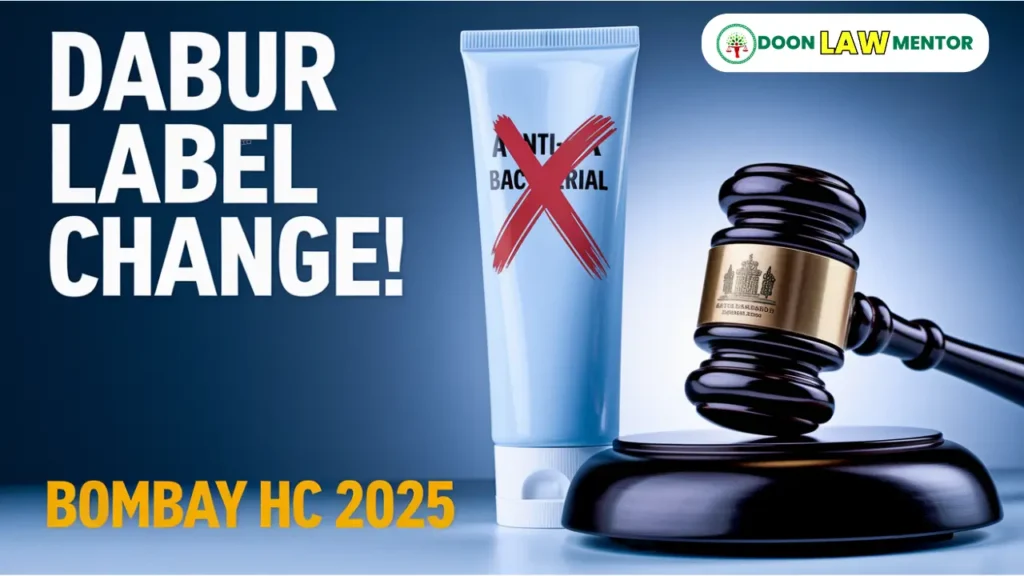In Dabur India Ltd v. State of Maharashtra (2025 Bombay HC), the Bombay High Court ordered Dabur to remove terms like “anti-inflammatory,” “anti-bacterial,” and “analgesic” from its Dabur Meswak and Dabur Herb’l Anti-Bacterial Toothpaste Tulsi labels by June 2025, following concerns by the Maharashtra FDA. Justices G S Kulkarni and Advait M Sethna accepted Dabur’s undertaking, ensuring compliance with statutory provisions. This blog analyzes the case, its implications, and its relevance for Judiciary, APO, and JLO aspirants preparing for 2025 exams.
Table of Contents
Introduction
On March 26, 2025, the Bombay High Court delivered a significant ruling in Dabur India Ltd v. State of Maharashtra (2025 Bombay HC), directing Dabur India Ltd to remove terms like “anti-inflammatory,” “anti-bacterial,” and “analgesic” from the labels of its Dabur Meswak Toothpaste and Dabur Herb’l Anti-Bacterial Toothpaste Tulsi by June 2025. Justices G S Kulkarni and Advait M Sethna accepted Dabur’s undertaking to revise its labels, following concerns raised by the Maharashtra Food and Drug Administration (FDA) about the legality of these claims. The court’s decision underscores the importance of statutory compliance in product labeling and consumer protection. This blog provides a detailed analysis of the Dabur India Ltd case, its legal implications, and its significance for Judiciary, APO, and JLO aspirants preparing for 2025 exams.
Background of the Case: Dabur India Ltd v. State of Maharashtra (2025 Bombay HC)
The case originated from an order issued by the Maharashtra Food and Drug Administration (FDA) on January 29, 2025, directing Dabur India Ltd to amend the labels of its two toothpaste products—Dabur Meswak Toothpaste and Dabur Herb’l Anti-Bacterial Toothpaste Tulsi—due to concerns over misleading claims.
Facts of the Case
- FDA Order: The Maharashtra FDA found that the terms “anti-inflammatory,” “anti-bacterial,” and “analgesic” on Dabur’s toothpaste labels were legally incorrect, as they implied medicinal properties not substantiated under the Drugs and Cosmetics Act, 1940, and its rules.
- Health Safety: While the FDA acknowledged that the products were not hazardous to health, it emphasized that the claims violated statutory provisions governing product labeling, potentially misleading consumers.
- Directive: The FDA instructed Dabur to revise the labels before the restricted stock could be released for sale, ensuring compliance with consumer protection and drug regulations.
- Dabur’s Response: Dabur approached the Bombay High Court, challenging the FDA’s order and seeking relief to continue marketing its products with the existing labels.
Bombay High Court Proceedings
- Dabur’s Undertaking: During the hearing, Senior Advocate Ravi Kadam, representing Dabur, informed the court that the company would voluntarily discontinue using the disputed terms and had already initiated the process to revise the labels and packaging.
- Timeline for Compliance: Dabur confirmed that the new labels, without the terms “anti-inflammatory,” “anti-bacterial,” and “analgesic,” would be in circulation by June 2025, following a detailed process involving design, printing, and distribution.
- Court’s Ruling: The bench, comprising Justices G S Kulkarni and Advait M Sethna, accepted Dabur’s undertaking as a court undertaking and disposed of the plea on March 26, 2025. The court stated: “The statement made on behalf of the petitioner that the petitioner product ‘Dabur Meswak Toothpaste’ and ‘Dabur Herb’l Anti-Bacterial Toothpaste Tulsi’ will not bear the words ‘anti-inflammatory’ and ‘anti-bacterial’ and ‘analgesic’ respectively with effect from June 2025 stand accepted as an undertaking to the court.”
- Sale Restrictions: The court permitted Dabur to sell the disputed products with existing labels until May 31, 2025, but prohibited marketing them with the contested terms after June 1, 2025.
Key Findings of the Bombay High Court in Dabur India Ltd v. State of Maharashtra
The Bombay High Court’s ruling in Dabur India Ltd v. State of Maharashtra (2025 Bombay HC) focused on ensuring statutory compliance in product labeling, with the following key findings:
1. Legality of Labeling Claims
- The court upheld the Maharashtra FDA’s concerns that the terms “anti-inflammatory,” “anti-bacterial,” and “analgesic” on Dabur’s toothpaste labels were legally incorrect, as they implied medicinal properties not substantiated under the Drugs and Cosmetics Act, 1940, and its rules.
- Such claims could mislead consumers into believing the toothpastes had therapeutic effects, violating consumer protection norms under the Consumer Protection Act, 2019, and drug regulations.
2. Voluntary Compliance by Dabur
- The court accepted Dabur’s undertaking to voluntarily discontinue the disputed terms, noting that the company had already initiated the process to revise its labels and packaging.
- The timeline of June 2025 for implementing the new labels was deemed reasonable, considering the logistical challenges of design, printing, and distribution across a large market.
3. Sale Restrictions and Compliance Deadline
- The court permitted Dabur to sell its existing stock with the contested labels until May 31, 2025, ensuring that the company could clear its inventory without significant financial loss.
- However, it strictly prohibited marketing the products with the terms “anti-inflammatory,” “anti-bacterial,” and “analgesic” after June 1, 2025, enforcing compliance with statutory provisions.
4. Role of the Maharashtra FDA
- The court recognized the Maharashtra FDA’s role in protecting consumer rights by ensuring that product labels are accurate and compliant with legal standards.
- The FDA’s order was upheld as a necessary measure to prevent misleading claims, aligning with its mandate under the Drugs and Cosmetics Act, 1940, to regulate cosmetic and drug products.
Legal Implications of the Judgment
The Bombay High Court’s ruling in Dabur India Ltd v. State of Maharashtra (2025 Bombay HC) has significant implications for consumer protection, product labeling, and corporate accountability:
1. Stricter Oversight on Product Labeling
- The judgment reinforces the importance of accurate product labeling, ensuring that companies do not make unsubstantiated claims that could mislead consumers.
- It aligns with the Supreme Court’s ruling in Indian Medical Association v. Union of India (2024), which emphasized the need for truthful advertising in the healthcare sector, a principle extended to cosmetic products like toothpaste in this case.
- Companies must now ensure that their labels comply with the Drugs and Cosmetics Act, 1940, and its rules, particularly for products with implied medicinal benefits.
2. Strengthening Consumer Protection
- The ruling enhances consumer protection by addressing misleading claims, a key concern under the Consumer Protection Act, 2019, which defines misleading advertisements as a violation of consumer rights.
- It builds on precedents like Colgate-Palmolive (India) Ltd v. Mr. Patel (2005), where the court held that false claims in advertising can lead to unfair trade practices, warranting regulatory action.
- The decision empowers regulatory bodies like the FDA to take proactive measures against misleading labeling, protecting consumers from deceptive marketing.
3. Corporate Accountability and Voluntary Compliance
- Dabur’s voluntary undertaking to revise its labels reflects a growing trend of corporate accountability, where companies opt for compliance to avoid prolonged litigation and reputational damage.
- This aligns with the Supreme Court’s approach in Hamdard National Foundation v. Union of India (2023), where the court encouraged companies to align with regulatory standards to maintain public trust.
- The ruling may encourage other companies to proactively review their labeling practices, ensuring compliance with statutory provisions to avoid legal challenges.
4. Impact on the FMCG Sector
- The decision has broader implications for the Fast-Moving Consumer Goods (FMCG) sector, particularly for cosmetic and personal care products that often make health-related claims.
- Companies like Colgate, Patanjali, and Himalaya, which also market toothpastes with similar claims, may face increased scrutiny from regulatory bodies, as noted in posts on X where users speculated about a “domino effect” in the industry.
- The ruling may lead to stricter enforcement of the Drugs and Cosmetics Rules, 1945, requiring companies to substantiate claims with scientific evidence or face penalties.
5. Precedent for Regulatory Compliance
- The court’s acceptance of Dabur’s undertaking sets a precedent for resolving regulatory disputes through voluntary compliance, reducing the burden on courts while ensuring consumer protection.
- This approach mirrors the Delhi High Court’s ruling in Patanjali Ayurved Ltd v. Union of India (2022), where the court accepted Patanjali’s undertaking to withdraw misleading advertisements, emphasizing self-regulation in the industry.
- The ruling may encourage regulatory bodies to adopt a collaborative approach with companies, balancing enforcement with practical solutions.
Critical Analysis: A Win for Consumer Protection or a Limited Remedy?
The Bombay High Court’s ruling in Dabur India Ltd v. State of Maharashtra (2025 Bombay HC) is a significant step toward consumer protection, but it also raises several questions:
- Strengths:
- Consumer Protection: The ruling ensures that misleading claims on product labels are addressed, protecting consumers from deceptive marketing practices.
- Regulatory Enforcement: It strengthens the Maharashtra FDA’s role in enforcing statutory compliance, setting a precedent for other regulatory bodies to act against unsubstantiated claims.
- Corporate Accountability: Dabur’s voluntary compliance reflects a positive trend of self-regulation, potentially encouraging other companies to align with legal standards.
- Challenges:
- Limited Scope: The ruling addresses only two Dabur products, leaving broader issues of misleading claims in the FMCG sector unaddressed, as noted in posts on X where users called for “industry-wide reforms.”
- Delayed Implementation: The June 2025 deadline allows Dabur to sell existing stock until May 31, 2025, potentially exposing consumers to misleading labels for several months.
- Lack of Penalties: The court did not impose penalties on Dabur, relying on voluntary compliance, which may not deter other companies from making similar claims, as seen in the Patanjali case where repeated violations occurred despite court orders.
- Missed Opportunity: The court could have issued broader guidelines for labeling practices in the FMCG sector, similar to the Supreme Court’s guidelines in Indian Medical Association v. Union of India (2024), to address systemic issues in cosmetic product marketing.
Overall, the ruling is a win for consumer protection, but its impact may be limited without broader regulatory reforms and stricter enforcement mechanisms.
Relevance for Judiciary, APO, and JLO Aspirants
The Dabur India Ltd v. State of Maharashtra (2025 Bombay HC) ruling is a critical topic for Judiciary, APO, and JLO aspirants preparing for 2025 exams:
- Prelims: Expect questions on the case name (Dabur India Ltd v. State of Maharashtra), the Maharashtra FDA’s order, the disputed terms (anti-inflammatory, anti-bacterial, analgesic), and the June 2025 compliance deadline.
- Mains: Write essays on topics like “Consumer Protection and Product Labeling: Judicial Perspectives” or “Role of Regulatory Bodies in FMCG Sector Compliance,” using this case to discuss statutory compliance, consumer rights, and corporate accountability, with references to Indian Medical Association v. Union of India (2024) and Colgate-Palmolive (India) Ltd v. Mr. Patel (2005).
- Interviews: Discuss the judiciary’s role in consumer protection, the impact of misleading claims on public health, and the need for regulatory reforms in the FMCG sector, citing Dabur India Ltd and related cases.
Conclusion
The Bombay High Court’s ruling in Dabur India Ltd v. State of Maharashtra (2025 Bombay HC) on March 26, 2025, marks a significant moment in consumer protection, directing Dabur India Ltd to remove terms like “anti-inflammatory,” “anti-bacterial,” and “analgesic” from its Dabur Meswak and Dabur Herb’l Anti-Bacterial Toothpaste Tulsi labels by June 2025. Justices G S Kulkarni and Advait M Sethna upheld the Maharashtra FDA’s concerns about misleading claims, ensuring statutory compliance and protecting consumer rights. The judgment sets a precedent for corporate accountability in the FMCG sector, aligning with precedents like Indian Medical Association v. Union of India (2024). For Judiciary, APO, and JLO aspirants, this case is a must-know for 2025 exams, offering insights into consumer protection law, regulatory compliance, and judicial oversight, and preparing them to tackle questions on these topics with confidence.
Call-to-Action
Master Dabur India Ltd v. State of Maharashtra (2025 Bombay HC) for your 2025 exams! Join Doon Law Mentor’s Courses for expert guidance. Follow @doonlawmentor on Instagram for daily legal updates!
FAQs
- What did the Bombay High Court rule in Dabur India Ltd v. State of Maharashtra (2025 Bombay HC)?
The Bombay High Court ordered Dabur to remove “anti-inflammatory,” “anti-bacterial,” and “analgesic” from its toothpaste labels by June 2025, following Maharashtra FDA concerns. - Which Dabur products were affected by the Bombay High Court ruling?
The ruling affected Dabur Meswak Toothpaste and Dabur Herb’l Anti-Bacterial Toothpaste Tulsi. - Why did the Maharashtra FDA order Dabur to change its toothpaste labels?
The Maharashtra FDA found the terms “anti-inflammatory,” “anti-bacterial,” and “analgesic” legally incorrect, as they implied unsubstantiated medicinal properties. - What was Dabur’s response to the Maharashtra FDA’s order?
Dabur voluntarily agreed to discontinue the disputed terms and revise its labels by June 2025, a process involving design, printing, and distribution. - What was the compliance deadline set by the Bombay High Court for Dabur?
The court set a deadline of June 1, 2025, allowing Dabur to sell existing stock until May 31, 2025. - What law governs the labeling of cosmetic products like toothpaste in India?
The Drugs and Cosmetics Act, 1940, and its rules govern the labeling of cosmetic and drug products, ensuring claims are substantiated. - How does the Dabur India Ltd case relate to consumer protection?
The ruling protects consumer rights by addressing misleading claims, aligning with the Consumer Protection Act, 2019, which prohibits unfair trade practices. - What precedent did the Bombay High Court follow in Dabur India Ltd?
The court followed precedents like Indian Medical Association v. Union of India (2024), emphasizing truthful advertising and consumer protection. - What broader impact might the Dabur India Ltd ruling have on the FMCG sector?
The ruling may lead to increased scrutiny of health-related claims in the FMCG sector, prompting companies to substantiate claims with scientific evidence. - Why is Dabur India Ltd v. State of Maharashtra important for Judiciary aspirants?
The case highlights consumer protection, regulatory compliance, and judicial oversight, making it a key topic for prelims, mains, and interviews in 2025 exams.
#DaburIndiaCase, #BombayHCRuling, #ToothpasteLabelChange, #MaharashtraFDA #daburindialtdvsstateofmaharastra #doonlawmentor










